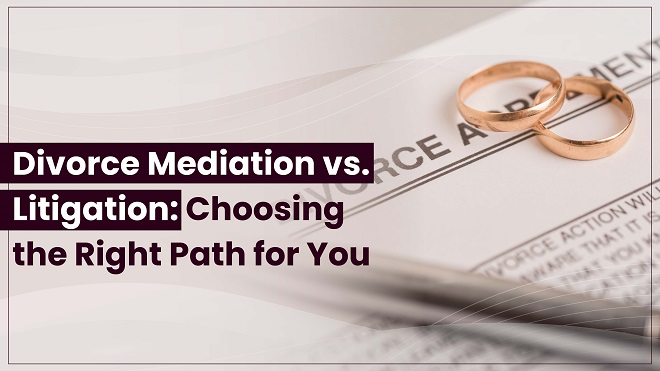Divorce Mediation vs. Litigation: Choosing the Right Path for You

Divorce is a difficult and stressful process that can have a lasting impact on your life. If you and your spouse have decided to end your marriage, you may be wondering how to go about it in the best possible way. There are two main options in our country as per Indian divorce rules: mediation and litigation.
In this blog, we will explain the differences between these two methods, the advantages and disadvantages of each, and how to choose the right one for your situation.
Table of Contents
|
What is Divorce Mediation?
Divorce mediation is a voluntary and confidential process where you and your spouse work with a neutral third party, called a mediator, to resolve the issues related to your divorce. The mediator does not make decisions for you but rather helps you communicate effectively, identify your needs and interests, and find mutually acceptable solutions. Indian divorce rules allow the mediator to provide information and guidance on legal, financial, and emotional matters but don’t allow them to give you legal advice.
The main goal of divorce mediation is to reach a settlement agreement that covers all the aspects of your divorce, such as:
- Division of assets and liabilities
- Child custody and visitation
- Child support and alimony
- Any other relevant issues
Once you and your spouse sign the settlement agreement, it becomes legally binding as per divorce law in India and can be submitted to the court for approval.
What is Divorce Litigation?
Divorce litigation is a formal and adversarial process where you and your spouse hire lawyers from firms like Lexsolutions to represent your interests and fight for your rights in court. The lawyers present evidence and arguments to the judge, who then makes decisions on all the issues related to your divorce. Indian divorce rules even allow the judge to appoint experts, such as psychologists, accountants, or valuators, to assist in the evaluation of complex matters.
When you hire a law firm Chandigarh or elsewhere, their main goal is obtaining a favourable outcome for you.
Advantages and Disadvantages of Divorce Mediation
Divorce mediation has many benefits in Indian divorce laws over litigation, such as:
- A typical mediation session is faster and cheaper than going to court as it lasts for 2-3 hours and costs around Rs. 10,000-15,000 per session.
- It is more flexible and creative than following the rigid rules of the court. Indian divorce rules allow you and your spouse to tailor the settlement agreement to suit your specific needs and preferences, rather than having to accept the standard terms imposed by the judge.
- It is more cooperative and respectful than engaging in a bitter conflict. You and your spouse can communicate directly and constructively, preserving a civil relationship with each other, which can benefit your children and future interactions.
- It is more private and confidential than exposing your personal matters to the public. The mediation sessions are held in a private setting and the discussions are not recorded or disclosed to anyone as of divorce in India rules say so.
However, divorce mediation also has some drawbacks, such as:
- It requires both parties to be willing and able to participate in good faith. If one or both of you are not ready or willing to cooperate, compromise, or communicate honestly, mediation may not work.
- It does not guarantee a fair or satisfactory outcome for both parties. If one or both of you are not well-informed or well-represented by the top law firm in Chandigarh or elsewhere, you may end up agreeing to something that is not in your best interest or that you may regret later and still have to challenge in court.
- It does not provide legal protection or representation for either party. The mediator cannot give you legal advice or advocate for your rights and you may still need to consult a lawyer.
Advantages and Disadvantages of Divorce Litigation
Divorce litigation, as per Indian divorce rules, also has some advantages over divorce mediation, such as:
- It provides legal protection and representation for both parties as lawyers can advise you on your rights and obligations, gather evidence and witnesses to support your case, negotiate on your behalf, and advocate for your interests in court. The judge can also issue orders to protect you from harm or harassment by your spouse.
- It ensures a final and enforceable outcome for both parties as the judge’s decisions are legally binding by divorce laws India and can be enforced by the court if one or both of you fail to comply. However, you’ll also have the option of appealing in a higher court.
- It may be necessary or preferable in some low-trust or low-cooperation divorces, involving issues such as infidelity, resentment, anger, revenge, and litigation. If you and your spouse have a high-conflict or high-stakes divorce, involving issues such as domestic violence, child abuse, substance abuse, mental illness, hidden assets, or complex property division, litigation may be the only way to resolve them.
However, divorce litigation also has many disadvantages over mediation, as per Indian divorce laws, such as:
- A typical litigation case can take months or years and cost lakhs of rupees in legal fees and expenses. The longer and more contentious the case, the higher the cost and the lower the quality of life for both parties.
- It is more rigid and adversarial than finding a win-win solution. You and your spouse have to follow the strict rules and procedures of the court as per Indian divorce laws, which may not suit your individual circumstances or preferences.
- On top of that, you and your spouse have to endure the emotional and psychological toll of litigation, which can affect your health, happiness, and productivity.
How to Choose the Right Path for You
There is no one-size-fits-all answer to the question of whether to choose mediation or litigation for your divorce. The best option for you depends on various factors, such as:
- Your personal goals and values
- Your relationship with your spouse
- The nature and complexity of your issues, depending on Indian divorce rules that apply
- The availability and quality of mediators and lawyers
- The cost and time involved in each process
- The potential risks and benefits of each outcome
Conclusion
Divorce mediation and litigation are two different ways of ending your marriage in India. You should weigh the pros and cons of each option carefully before making a decision. Indian divorce rules allow you to seek professional help from a lawyer or a mediator to guide you through the process. Ultimately, choose the option that best meets your needs and goals for yourself, your spouse, and your children.
FAQs
1.Can the court order mediation in a divorce litigation case?
Yes, the court can order mediation, called court-mandated mediation, even after you’ve taken a divorce litigation route initially.
2. What are the two kinds of divorce?
The two kinds of divorce in India are contested divorce and uncontested divorce.
3. Which Indian divorce law is applicable to an interfaith couple?
Interfaith marriages and divorce are governed by the Special Marriage Act.
4. Is triple talaq a crime?
Yes, triple talaq is now considered illegal, as a recent historic judgement by the Supreme Court declared it unconstitutional.





